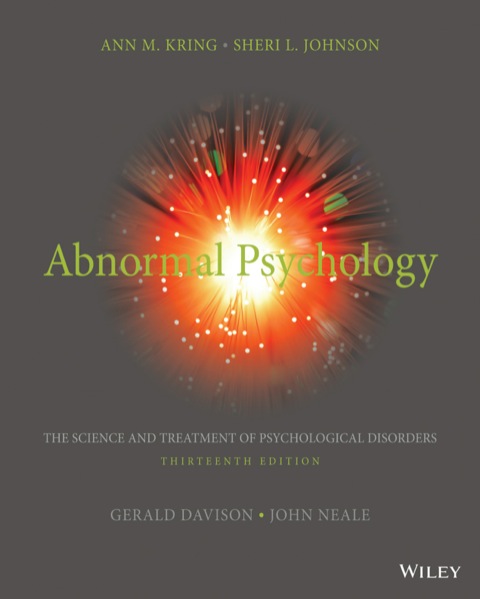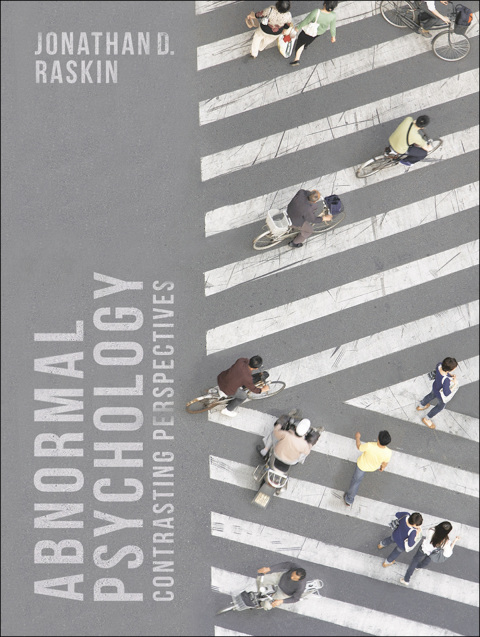Description
Efnisyfirlit
- Title Page
- Copyright
- Contents
- 1 Introduction and Historical Overview
- Defining Psychological Disorder
- Personal Distress
- Disability
- Violation of Social Norms
- Dysfunction
- History of Psychopathology
- Early Demonology
- Early Biological Explanations
- The Dark Ages and Demonology
- Development of Asylums
- The Evolution of Contemporary Thought
- Biological Approaches
- Psychological Approaches
- Have We Learned from History?
- The Mental Health Professions
- Summary
- 2 Current Paradigms in Psychopathology
- The Genetic Paradigm
- Behavior Genetics
- Molecular Genetics
- Gene–Environment Interactions
- Evaluating the Genetic Paradigm
- The Neuroscience Paradigm
- Neurons and Neurotransmitters
- Structure and Function of the Human Brain
- The Neuroendocrine System
- The Immune System
- Neuroscience Approaches to Treatment
- Evaluating the Neuroscience Paradigm
- The Cognitive Behavioral Paradigm
- Influences from Behavior Therapy
- Cognitive Science
- The Role of the Unconscious
- Cognitive Behavior Therapy
- Evaluating the Cognitive Behavioral Paradigm
- Factors That Cut Across the Paradigms
- Emotion and Psychopathology
- Sociocultural Factors and Psychopathology
- Interpersonal Factors and Psychopathology
- Diathesis–Stress: An Integrative Paradigm
- Summary
- 3 Diagnosis and Assessment
- Cornerstones of Diagnosis and Assessment
- Reliability
- Validity
- Classification and Diagnosis
- The Diagnostic System of the American Psychiatric Association: DSM-5
- Changes in DSM-5
- Specific Criticisms of the DSM
- General Criticisms of Diagnosing Psychological Disorders
- Psychological Assessment
- Clinical Interviews
- Assessment of Stress
- Personality Tests
- Intelligence Tests
- Behavioral and Cognitive Assessment
- Neurobiological Assessment
- Brain Imaging: “Seeing” the Brain
- Neurotransmitter Assessment
- Neuropsychological Assessment
- Psychophysiological Assessment
- A Cautionary Note About Neurobiological Assessment
- Cultural and Ethnic Diversity and Assessment
- Cultural Bias in Assessment
- Strategies for Avoiding Cultural Bias in Assessment
- Summary
- 4 Research Methods in Psychopathology
- Science and Scientific Methods
- Approaches to Research on Psychopathology
- The Case Study
- The Correlational Method
- The Experiment
- Integrating the Findings of Multiple Studies
- Summary
- 5 Mood Disorders
- Clinical Descriptions and Epidemiology of Mood Disorders
- Depressive Disorders
- Bipolar Disorders
- Subtypes of Depressive Disorders and Bipolar Disorders
- Etiology of Mood Disorders
- Genetic Factors
- Brain Function: Regions Involved in Emotion
- The Neuroendocrine System: Cortisol Dysregulation
- Social Factors in Depression: Childhood Adversity, Life Events, and Interpersonal Difficulties
- Psychological Factors in Depression
- Social and Psychological Factors in Bipolar Disorder
- Treatment of Mood Disorders
- Psychological Treatment of Depression
- Psychological Treatment of Bipolar Disorder
- Biological Treatment of Mood Disorders
- Suicide
- Epidemiology of Suicide and Suicide Attempts
- Risk Factors for Suicide
- Preventing Suicide
- Summary
- 6 Anxiety Disorders
- Clinical Descriptions of the Anxiety Disorders
- Specific Phobias
- Social Anxiety Disorder
- Panic Disorder
- Agoraphobia
- Generalized Anxiety Disorder
- Comorbidity in Anxiety Disorders
- Gender and Cultural Factors in the Anxiety Disorders
- Gender
- Culture
- Common Risk Factors Across the Anxiety Disorders
- Fear Conditioning
- Genetic Factors
- Neurobiological Factors: The Fear Circuit and the Activity of Neurotransmitters
- Personality: Behavioral Inhibition and Neuroticism
- Cognitive Factors
- Etiology of Specific Anxiety Disorders
- Etiology of Specific Phobias
- Etiology of Social Anxiety Disorder
- Etiology of Panic Disorder
- Behavioral Factors: Classical Conditioning
- Etiology of Agoraphobia
- Etiology of Generalized Anxiety Disorder
- Treatments of the Anxiety Disorders
- Commonalities Across Psychological Treatments
- Psychological Treatments of Specific Anxiety Disorders
- Medications That Reduce Anxiety
- Medication to Enhance Learning During Psychological Treatment
- Summary
- 7 Obsessive-Compulsive-Related and Trauma-Related Disorders
- Obsessive-Compulsive and Related Disorders
- Clinical Descriptions of the Obsessive-Compulsive and Related Disorders
- Prevalence and Comorbidity of the Obsessive-Compulsive and Related Disorders
- Etiology of the Obsessive-Compulsive and Related Disorders
- Treatment of the Obsessive-Compulsive and Related Disorders
- Posttraumatic Stress Disorder and Acute Stress Disorder
- Clinical Description and Epidemiology of Posttraumatic Stress Disorder and Acute Stress Disorder
- Etiology of Posttraumatic Stress Disorder
- Treatment of Posttraumatic Stress Disorder and Acute Stress Disorder
- Summary
- 8 Dissociative Disorders and Somatic Symptom-Related Disorders
- Dissociative Disorders
- Depersonalization/Derealization Disorder
- Dissociative Amnesia
- Dissociative Identity Disorder
- Treatment of DID
- Somatic Symptom and Related Disorders
- Clinical Description of Somatic Symptom Disorder
- Clinical Description of Illness Anxiety Disorder
- Clinical Description of Conversion Disorder
- Etiology of Somatic Symptom-Related Disorders
- Treatment of Somatic Symptom and Related Disorders
- Summary
- 9 Schizophrenia
- Clinical Descriptions of Schizophrenia
- Positive Symptoms
- Negative Symptoms
- Disorganized Symptoms
- Schizophrenia and the DSM-5
- Etiology of Schizophrenia
- Genetic Factors
- The Role of Neurotransmitters
- Brain Structure and Function
- Connectivity in the Brain
- Environmental Factors Influencing the Developing Brain
- Psychological Factors
- Developmental Factors
- Treatment of Schizophrenia
- Medications
- Psychological Treatments
- Summary
- 10 Substance Use Disorders
- Clinical Descriptions, Prevalence, and Effects of Substance Use Disorders
- Alcohol Use Disorder
- Tobacco Use Disorder
- Marijuana
- Opiates
- Stimulants
- Hallucinogens, Ecstasy, and PCP
- Etiology of Substance Use Disorders
- Genetic Factors
- Neurobiological Factors
- Psychological Factors
- Sociocultural Factors
- Treatment of Substance Use Disorders
- Treatment of Alcohol Use Disorder
- Treatments for Smoking
- Treatment of Drug Use Disorders
- Prevention of Substance Use Disorders
- Summary
- 11 Eating Disorders
- Clinical Descriptions of Eating Disorders
- Anorexia Nervosa
- Bulimia Nervosa
- Binge Eating Disorder
- Etiology of Eating Disorders
- Genetic Factors
- Neurobiological Factors
- Cognitive Behavioral Factors
- Sociocultural Factors
- Other Factors Contributing to the Etiology of Eating Disorders
- Treatment of Eating Disorders
- Medications
- Psychological Treatment of Anorexia Nervosa
- Psychological Treatment of Bulimia Nervosa
- Psychological Treatment of Binge Eating Disorder
- Preventive Interventions for Eating Disorders
- Summary
- 12 Sexual Disorders
- Sexual Norms and Behavior
- Gender and Sexuality
- The Sexual Response Cycle
- Sexual Dysfunctions
- Clinical Descriptions of Sexual Dysfunctions
- Etiology of Sexual Dysfunctions
- Treatments of Sexual Dysfunctions
- The Paraphilic Disorders
- Fetishistic Disorder
- Pedophilic Disorder and Incest
- Voyeuristic Disorder
- Exhibitionistic Disorder
- Frotteuristic Disorder
- Sexual Sadism and Masochism Disorders
- Etiology of the Paraphilic Disorders
- Treatments for the Paraphilic Disorders
- Summary
- 13 Disorders of Childhood
- Classification and Diagnosis of Childhood Disorders
- Attention-Deficit/Hyperactivity Disorder
- Clinical Descriptions, Prevalence, and Prognosis of ADHD
- Etiology of ADHD
- Treatment of ADHD
- Conduct Disorder
- Clinical Description, Prevalence, and Prognosis of Conduct Disorder
- Etiology of Conduct Disorder
- Treatment of Conduct Disorder
- Depression and Anxiety in Children and Adolescents
- Depression
- Anxiety
- Specific Learning Disorder
- Clinical Descriptions
- Etiology of Specific Learning Disorder
- Treatment of Specific Learning Disorder
- Intellectual Disability
- Diagnosis and Assessment of Intellectual Disability
- Etiology of Intellectual Disability
- Genetic or Chromosomal Abnormalities
- Treatment of Intellectual Disability
- Autism Spectrum Disorder
- Clinical Descriptions, Prevalence, and Prognosis of Autism Spectrum Disorder
- Etiology of Autism Spectrum Disorder
- Treatment of Autism Spectrum Disorder
- Summary
- 14 Late Life and Neurocognitive Disorders
- Aging: Issues and Methods
- Myths About Late Life
- The Problems Experienced in Late Life
- Research Methods in the Study of Aging
- Psychological Disorders in Late Life
- Estimating the Prevalence of Psychological Disorders in Late Life
- Methodological Issues in Estimating the Prevalence of Psychopathology
- Neurocognitive Disorders in Late Life
- Dementia
- Delirium
- Summary
- 15 Personality Disorders
- The DSM-5 Approach to Classification
- Assessment of DSM-5 Personality Disorders
- Problems with the DSM-5 Approach to Personality Disorders
- Alternative DSM-5 Model for Personality Disorders
- Common Risk Factors Across the Personality Disorders
- Clinical Description and Etiology of the Odd/Eccentric Cluster
- Paranoid Personality Disorder
- Schizoid Personality Disorder
- Schizotypal Personality Disorder
- Clinical Description and Etiology of the Dramatic/Erratic Cluster
- Antisocial Personality Disorder and Psychopathy
- Borderline Personality Disorder
- Histrionic Personality Disorder
- Narcissistic Personality Disorder
- Clinical Description and Etiology of the Anxious/Fearful Cluster
- Avoidant Personality Disorder
- Dependent Personality Disorder
- Obsessive-Compulsive Personality Disorder
- Treatment of Personality Disorders
- General Approaches to the Treatment of Personality Disorders
- Summary
- 16 Legal and Ethical Issues
- Criminal Commitment
- The Insanity Defense
- Landmark Cases and Laws
- Competency to Stand Trial
- Insanity, Intellectual Disability, and Capital Punishment
- Civil Commitment
- Preventive Detention and Problems in the Prediction of Dangerousness
- Protection of the Rights of People with Psychological Disorders
- Deinstitutionalization, Civil Liberties, and Mental Health
- Ethical Dilemmas in Therapy and Research
- Ethical Restraints on Research
- Informed Consent
- Confidentiality and Privileged Communication
- Summary
- Glossary
- References
- Name Index
- Subject Index
- EULA







Reviews
There are no reviews yet.